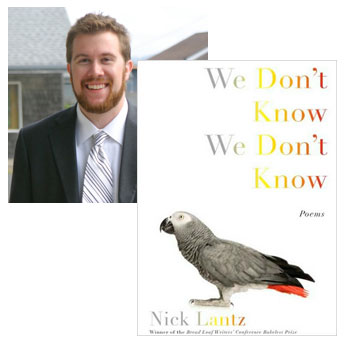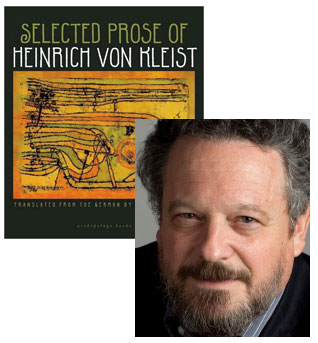Nick Lantz, “Lacuna, Triptych of the Battle”

First Panel
A confusion of soldiers—the guide counts
for us ten helmeted heads but twenty-five
boots—cramped below the castle wall.
Are they mustering for a surge or balking
just beyond the archers’ reach?Second Panel
Ripped away, only a skirt of paint hemming
top and bottom, forty-seven boots kissing,
toe-to-toe. At the top, a ribbon of sky, a broken
spearhead hangs loose in the air, like an iron
falcon folded to drop. So rare, says the guide,
for motion to be conveyed this way.Third Panel
An army victorious, but high on the flagpole
its standard has been pried away for its gold
enamel, so who can say which army
it is, invader or defender? The guide smiles,
points to the missing triangle. This theft
too, he says, is hundreds of years
old. This theft too is part of history.
Nick Lantz‘s debut collection of poems, We Don’t Know We Don’t Know, won the Bread Loaf Writers’ Conference Bakeless Prize; the University of Wisconsin Press will be publishing a second collection, The Lightning That Strikes the Nieghbors’ House, in April. You may recognize the title of this first book as the tail end of a famous statement by then-Secretary of Defense Donald Rumsfeld about known knowns and unknown unknowns; the collection also includes poems like “Of the Parrat and other birds that can speake.”
Lantz was also a finalist for the Anthony Hecht Poetry Prize. And he’s on Twitter, posting a new original poem every day—as he explains, “140 characters… makes for a nice formal restriction.”
7 February 2010 | poetry |
Peter Wortsman & the Box-Sentences of Heinrich von Kleist

I’m looking forward to Selected Prose of Heinrich von Kleist, one of the most recent titles from Archipelago Books, an independent press dedicated to international translation—and my eagerness is stoked even higher by this description by Kleist’s translator, Peter Wortsman, of the effort to render Kleist’s intricate prose style into just the right English.
Unlike the stalwart scribes that comprise the dominant strain of German letters, giants like Goethe, Mann and Brecht, one-man classics factories who spew wisdom in every breath and make library shelves buckle under the sheer weight of their words, Heinrich von Kleist belongs to a parallel literary strain, a trembling class of German writers whose ranks include playwrights Jakob Michael Reinhold Lenz and Georg Büchner, enigmatic prose masters Franz Kafka and Robert Walser, and poet Paul Celan, to name a few. Their work—call it imperiled poetry, naked drama, or in Kleist’s case, self-destructing stories—puts its finger on the raw nerves of the real, sabotaging any pretense of certainty. Far from satisfying the reader’s need for assurance, Kleist’s stories still read today, 200 years after his death by suicide at the age of 34, like kamikaze attacks on the status quo.
Attempting to translate his prose is a rarefied, risky business akin to playing Russian roulette with a gold bullet, strolling over a half-frozen lake, or savoring blowfish sushi from which one is not altogether certain the chef has removed the deadly venom. The thrill of that lingering doubt naturally adds to the tingle, making every word all the more vital. Kleist played for keeps in everything he did, and every tempered sentence trembles with that sense of imminence transmuted from life into literature.
Having tackled other daunting stylistic challenges, including an English rendering of Robert Musil’s Posthumous Papers of a Living Author, now in its third edition (Eridanos, 1988; Penguin 20th-century Classics, 1993; Archipelago Books, 2006)—which, I am proud to note, was cited in the journal Modern Austrian Literature as “a kind of classic in itself”—I took on Kleist with mixed delight and trepidation. In the Musil translation, done more than 20 years ago, I had deemed it expedient to selectively subdivide his interminably long Teutonic sentences to appease an American predilection for syntactical simplicity. The result made Musil accessible to the contemporary English reader, while not, I hope, mutilating the essence. (Although a disgruntled Musil did appear to me in a dream, protesting what he called “schlamperte Arbeit,” a sloppy job.)
I have since come to the conviction that a sentence is a writer’s most intimate signature of self, that its structure follows the fault lines of the psyche that shaped it and should not, except in rare cases in which not to do so would obfuscate meaning, be tampered with in translation. This is particularly true of the Kleistian so-called “Schachtelsatz,” (box-sentence), a painstakingly constructed, airtight narrative nugget with a grain of truth at the core, around which he built his stories, layer upon layer, the way an oyster salivates pearls around a grain of sand. Disinclined to undue haste, the 19th German mindset took its sweet time in the telling, often getting tangled in subordinate clauses and occasionally losing its thread along the way, but Kleist always pulls it off with the surefootedness of a sleepwalker on an internalized tightrope.
Or to bend the metaphor, with his finger on the thread of Ariadne, Kleist took frequent strolls in a psychic labyrinth of his own confection, unafraid to meet, indeed courting the Minotaur within. He can no more be blamed for the convolutions of his narrative thread than can the Grimms’ Märchen hero Hans be blamed for strewing bread crumbs when he ran out of white pebbles. That was the only way out.
3 February 2010 | in translation |

 Our Endless and Proper Work is my new book with Belt Publishing about starting (and sticking to) a productive writing practice.
Our Endless and Proper Work is my new book with Belt Publishing about starting (and sticking to) a productive writing practice. 
